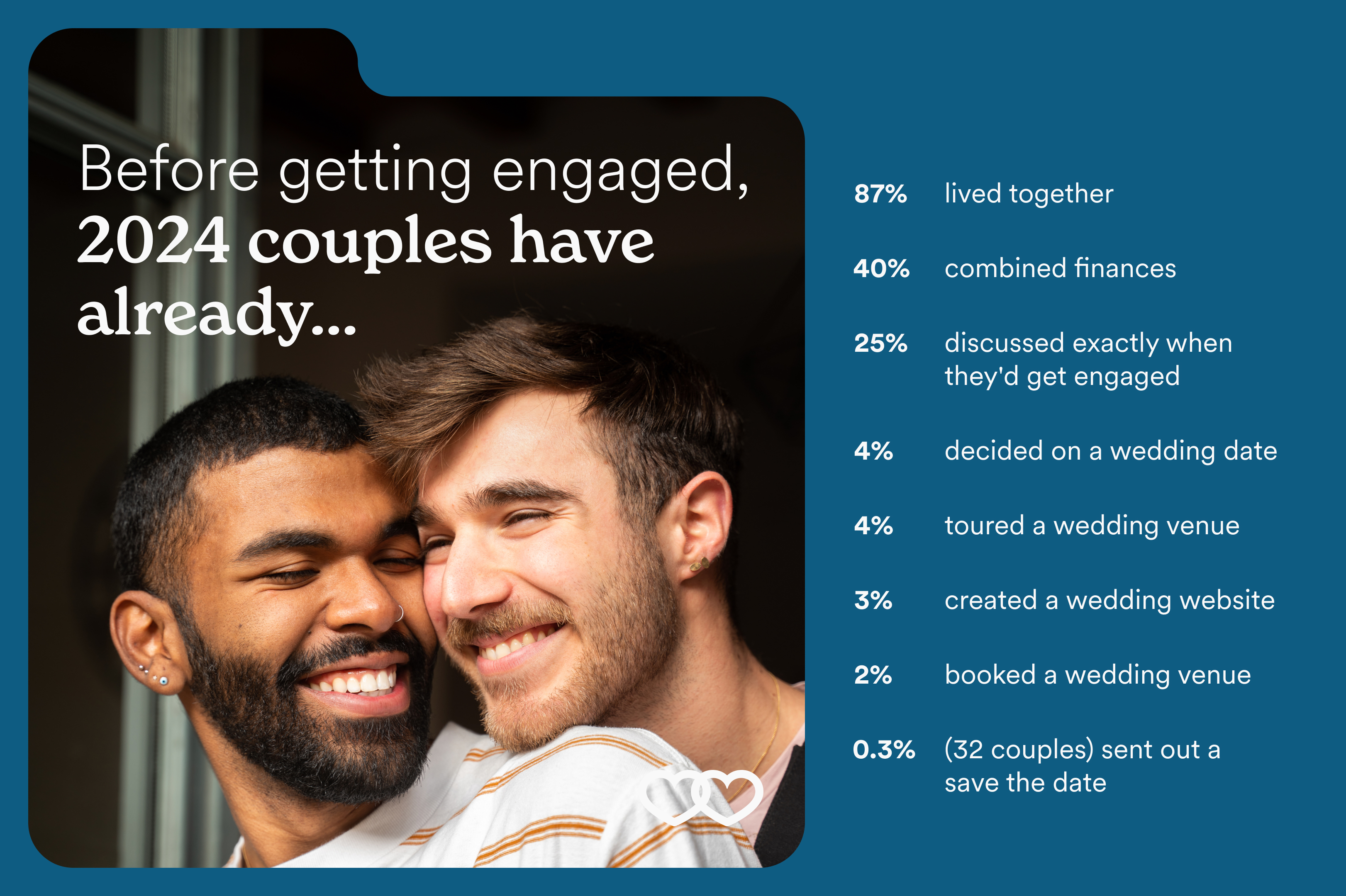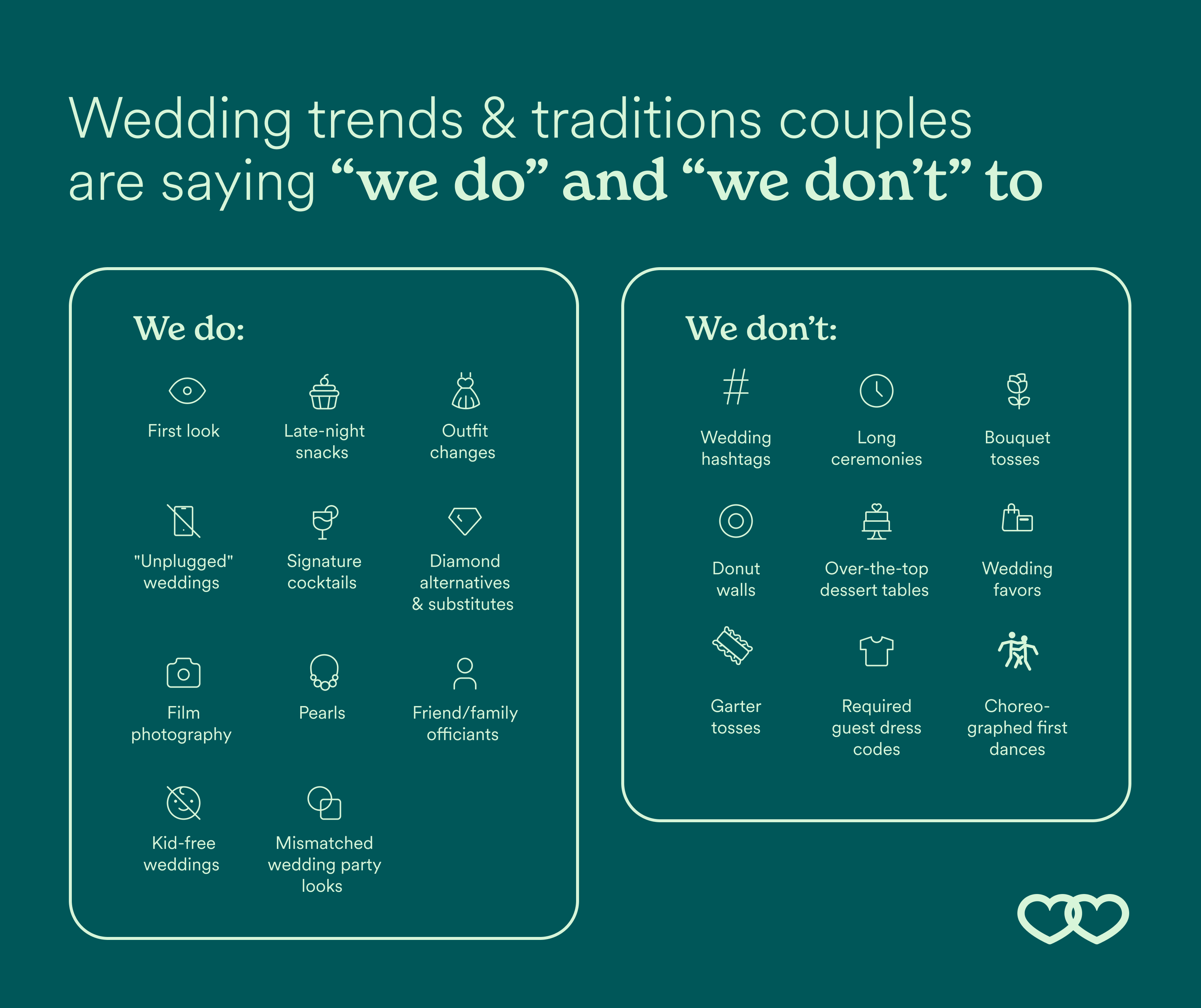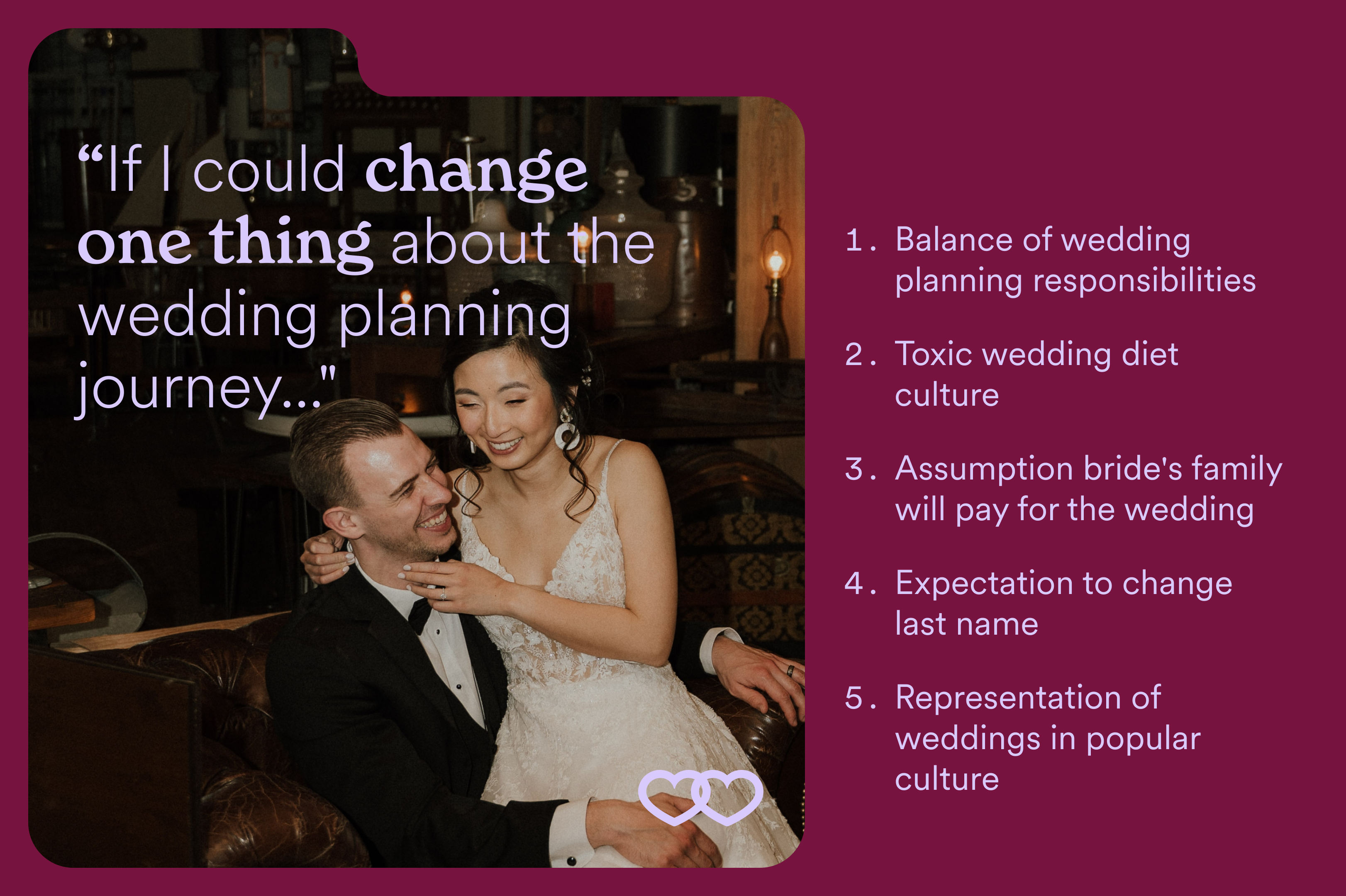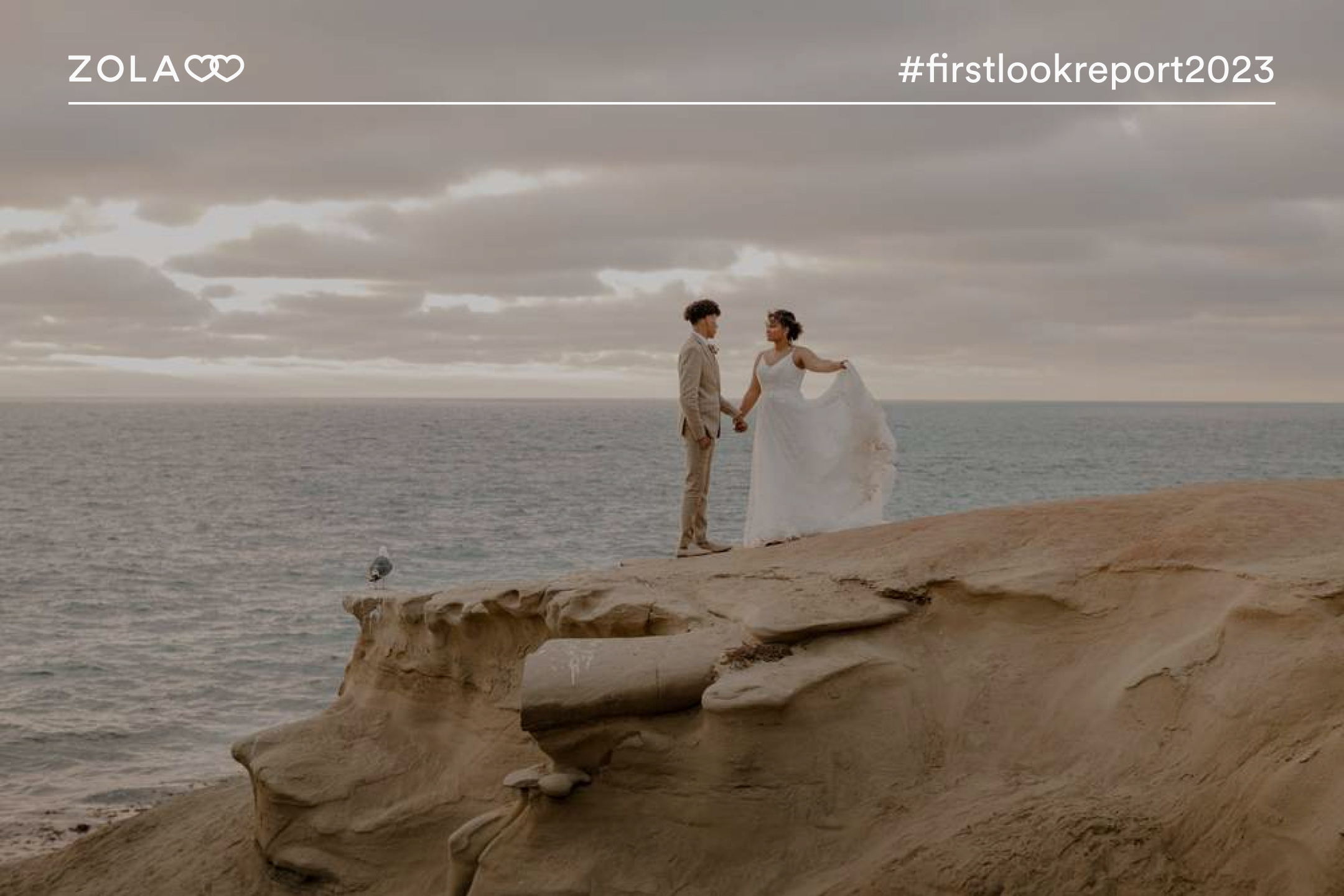- Expert advice/
- Wedding trends/
- First Look Reports/
- 2024 Wedding Trends: Zola's First Look Report
- First Look Reports
2024 Wedding Trends: Zola's First Look Report
For our annual First Look Report we surveyed close to 7,000 couples getting married in 2024 about what, why, and how they’re planning for their weddings. From this data, we highlight the year’s top wedding trends. Here’s what we found.
Last updated December 12, 2024

The First Look ✨
- “Will you marry me” is becoming a formality as couples become even more confident taking steps towards the aisle before the question is popped. 89% of couples have started wedding planning before getting engaged.
- In 2024, love does cost a thing, with the average cost of a wedding hitting a high of over $30,000.
- Weddings are full-on social media affairs, with celebs/influencers as a source of inspo increasing 48% since last year. Sofia Richie and Elliot Grainge’s celebration was the most thumb-stopping.
- Couples are embracing tech, but unplugging on their big day. 86% of couples are making choices based on social media, and 19% are likely or already using an AI tool; at the same time, 75% are embracing phone-free weddings.
- Next gen couples are mixing up their wedding style - embracing multiple outfit changes, mismatched wedding party attire, and diamond alternatives as a way to make the wedding their own
- From sharing the mental load of wedding planning to shedding expectations around wedding diets, modern couples continue to push our industry into a better and more inclusive future.
We surveyed close to 7,000 couples with wedding dates in 2024 about what, why, and how they’re planning for the coming year. What did we find out?
In 2024, there are many reasons couples want to have a wedding, but most of all, they want to have the fun party that they’ve been dreaming about forever. And, party is a good word to describe what 2024 has in store with guest lists stretching to 145, inspiration stemming from influencers, couples selecting venues based on vibe, and splurging on the best photographers to capture every memory.
But, in response to a challenging economy, love does cost a thing. Weddings in 2024 do come with an average higher price tag than last year, with the average cost of a wedding hitting above the $30,000 mark.
Our report also identifies how evolving trends and consumer behavior has influenced the journey – couples are using Artificial Intelligence tools to help with planning, incorporating inspo from viral celeb #WeddingToks, selecting off-peak dates to save money, and registering for even more cash funds as they cover many wedding costs themselves. Expect garden parties galore, short-personalized ceremonies officiated by loved ones, loads of late night snacks, mismatched wedding party style, multi-day parties, and, overall, a huge amount of energy, authenticity and love.
Wedding Planning, Pre-Engagement
Couples getting married in 2024 may just be the next generation of wedding planners, and they've truly enjoyed the journey. 18% of couples describe their experience deciding on wedding details to be so amazing, they would do it for a living. With carte blanche to get creative, access to free tools that allow you to plan from anywhere, and wedding experts to guide you along the way - what’s not to love?
In fact, many couples are so into planning, they aren’t waiting for a ring to get started. And, why should they? 89% of couples are beginning the wedding planning process before formally getting engaged, and of these, 17% took, what is in our professional opinion, a very concrete step in their journey before any question was popped. They either: booked a wedding venue together, created their wedding website, shopped for wedding attire, created their wedding registry, asked loved ones to join their wedding party, and/or sent out a save-the-date. Yes, we said booked, not just looked. 297 couples booked their wedding venue before officially, as society defines it, getting engaged.
Getting Engaged
Here’s what this tells us about today’s engaged generation – just as modern couples are very purposeful in deciding to have a wedding event, they are also very purposeful in how they are getting engaged and planning every day along the way. The ring, while still bursting with meaning and likely lab-grown, is not the first step towards forever. The majority of couples have been together for on average 5 years, already live together (88%), have combined their finances (40%), and have discussed exactly when they’ll be getting engaged (25%). We also can’t discount that 100% of these couples have been together for what can only be described as a memorable half a decade including a global pandemic, a teetering economy, fights for human rights and marriage equality. 2024 couples are simply practical, with eyes on the prize – each other – and we’re here for it.

How Does it Feel to Plan a Wedding?
Even with the best intent, it’s statistically significant to say that wedding planning is a glass case of emotion. Exciting was by far the most common feeling used to describe wedding planning. But, a comparable number of couples told us wedding planning is simultaneously stressful and fun, special and overwhelming, full of love and unexpected, and inspiring while absurd.
What part of the process is most overwhelming? If we had to guess, we might point to the 44% of couples who are experiencing family drama while wedding planning, or the 39% who said their parents/guardians have made the process more difficult. But, the #1 pain point of the actual to-do list as ranked by couples continues to be creating and managing their budgets, followed by creating and managing their guest lists, and booking their vendors. This is no surprise, considering 90% of 2024 couples are contributing financially to their weddings, with 30% covering every penny themselves. Luckily, Zola has innovative tools like a budget tracker, a guest list manager, and a vendor marketplace to help couples with all three of these pain points.

2024 Wedding Trends
Now, onto the most fun stuff besides the parties themselves– a definitive look at the emerging trends for 2024.
- Celeb wedding content is getting more than 15 minutes of fame. In comparison to 2023, 48% more couples with weddings coming in 2024 have been directly influenced by influencer weddings. One couple broke the internet in 2023 – Sofia Richie and Elliot Grainge received 48% of the votes for the ‘most influential wedding of the year’, followed by Dylan Sprouse and Barbara Palvin, and Simone Biles and Jonathan Owens. To-be-weds simply loved watching Sofia’s “relatable” yet sophisticated GRWM content leading up to her wedding. And, the duo’s embrace of party vibes clearly made an impact.
- As the next generation walks down the aisle, social media is becoming even more crucial. 92% of Gen-Zers said that social media is an essential part of their planning process, the highest percentage of any generation. Pinterest remains the #1 source of wedding inspo overall, but the second slot is caught in a generational battle between Gen-Zers who’re all about #WeddingTok, and millennials who turn to Instagram for their daily dose of wedding planning.
- Garden wedding style is in full bloom. In fact, it’s the #2 wedding style of 2024, only behind classic, with 13% of couples describing their wedding to be garden-inspired.
- Speaking of gorgeous green-like garden parties, we predict green to be the wedding color of the year. Beyond white, green is the most popular color of Zola wedding paper ordered for 2024 weddings. Wedding invites with green shades like sage, emerald, forest, khaki, mint, olive and basil are up by 81%. Blue, and specifically shades such as sky, are a close maid of honor.
- Artificial Intelligence (AI) has officially landed in weddings, and it shouldn’t be so surprising that Zola couples are quick to jump on emerging technology. 7% of couples admit to already using at least one AI tool while 11% are planning to incorporate it into wedding planning. 36% are considering it, but not sure yet. In total, this equates to 54% who said yes or maybe, vs. 46% who are unlikely to use AI.
- The party vibe lends itself to personalization and to a much larger shift – the secularization of weddings. For the second consecutive year, more than ½ of weddings will be officiated by loved ones, and a significant portion of couples, 28%, are having religion-free weddings. It is widely documented that younger generations are less likely to identify with a religious group.
- Everybody is invited to the welcome party this year. Compared to 2023, we saw a 32% jump in the number of couples who are having a bash the day before the day. We love this trend because a welcome party is the perfect opportunity to greet guests before the wedding itself, and get some formal hello’s out of the way before the big day.
- Welcome parties are especially nice for guests who have traveled long distances, and in 2024 destination weddings are making a comeback as 36% of events require guests to travel by plane, train, or very long automobile ride. This includes 8% of weddings that are planned internationally, and 28% of weddings that are planned within the U.S. but far enough away from the majority of guests. Compared to 2023 these are significant year-over-year increases of 34% and 55% respectively. On the flip side, wedding guests will have an easy drive to 64% of weddings.
What's In, What's Out
Couples also took to the “polls” to settle some very hot button issues. A few first looks: wedding hashtags, donut walls and dessert tables, bouquet tosses, and long ceremonies are decidedly “out” while diamond alternatives, pearls, outfit changes, kid-free weddings and mismatched wedding party attire are very “in”. A few debates remain too close to call including required guest dress-code, elaborate exits and choreographed first dances.

Wedding Cost and Budget Trends
As much as we wish hashtags and dress-codes were the biggest sources of stress during the process, we know planning a wedding can be a minefield – both financially and emotionally. In 2024, the average cost of a wedding will increase from 2023 (link), hiking above the $30,000 mark as more couples than last year budget between the $30k - $40k and $40k - $50k buckets. While this number may set off sticker shock, economic changes have impacted the cost of goods and services across many industries. In 2023, 83% of Zola wedding vendors reported that the cost to run their business had been driven up by inflation.*
With the average cost of a wedding going up, couples are finding creative ways to save, and spend wisely. The #1 reason Zola couples choose digital save-the-dates is because they are completely free and easy to send. 56% of couples thought budget-first in selecting their wedding venue, and 14% chose an off-peak date, aka a not-summer-or-fall Saturday. 87% of couples are adding personalized cash funds to their Zola registries, using this money to not only help cover some wedding costs, but also post-wedding financial priorities such as the first purchase of a home. The number of couples adding cash funds is up 6% from 2023, which at the time we believed to be an all-time high.

It’s also important to call out that, even as we work alongside members of our industry everyday to celebrate and support all love, we know the journey is not equitable for many couples including members of the LGBTQ+ community. In our own data there is a noticeable divide in comparing who contributes financially to sexual orientation. It’s true that the vast majority of all couples contribute financially, but it’s also true that a larger percentage of LGBTQ+ couples, in comparison to heterosexual couples, are responsible for covering wedding costs:
- 38% of LGBTQ+ couples are paying in full for their weddings in comparison to 27% of heterosexual couples.
- 13% of heterosexual couples have their wedding costs completely covered by loved ones, while the same is only true for 6% of LGBTQ+ couples.
Sharing Wedding Planning Responsibilities
And, the overall balance of wedding planning responsibilities is…very unbalanced. In fact, for millennial couples, the stereotypical assumption that one person will take on the majority of wedding planning responsibilities is the #1 societal expectation they want to change. In contrast to the financial data above, LGBTQ+ couples generally have a more positive experience sharing wedding planning responsibilities equally. But, between women and men who are marrying each other there is a clear discrepancy about time spend:
- Only 1% of women feel their male partner spends more time wedding planning, but 35% of men said their female partner spends more time wedding planning.
- 7% of women feel their male partner spends equal time wedding planning, but 36% of men said they spend equal time planning.
- 8% of women said their male partner helps them “literally zero”, but 0% of men with female partners responded this way.
Several truths can exist here–regardless of identity, most people who opt into a lengthy wedding planning survey are likely very interested in wedding planning and/or are assuming a significant amount of responsibility during the process. While the data speaks for itself, it may also be true that the men who answered our survey are very much active participants in the process.
Societal Expectations
As much as we work to promote progress and inclusivity in the wedding industry, and watch it evolve alongside technology, social media, and consumer trends, the vast majority of couples, 83%, believe that at least one societal expectation is due for a change. For Gen-Z, toxic wedding diet culture and the expectation for the bride’s family to pay for the wedding rank just slightly above the imbalance of responsibilities. For many couples who identify as part of the LGBTQ+ community, gendered wedding parties, being “given away” and representation of weddings in media and popular culture beg for further disruption.

Through it all, couples are there for each other, and that’s what it’s all about. For most to-be-weds (79%), their partner is their absolute rock for every day along the way. After the fun party that is a 2024 wedding, 87% of couples are using their cash funds to help pay for their dream honeymoon. They’re prioritizing purchasing a home together, starting a family, paying off debts, and simply taking a breather to enjoy married life.
Want to see all the data? Visit our all-the-data breakdown here, and contact [email protected] for any media inquiries.
Featured

Just Engaged? Here’s What To Do Next!
Inspiration
Just engaged and wondering what’s next? A lot goes into wedding planning, but you don’t have to do it all at once. Here are the must-do to-dos after getting engaged.

How to Find Wedding Vendors Who Align With Your Values
How-To
Everything you need to know to find values-based wedding vendors.

How to Set Your Wedding Budget Step by Step
How-To
While it may not be the most exciting item on your to-do list, setting your wedding budget is essential. We’ll break down the typical expenses, guide you through the entire process from start to finish, and tell you where you can save money.

Top Places Couples Actually Met Each Other
List
Here’s a look into where our 2023 couples’ love stories started.
- Expert advice/
- Wedding trends/
- First Look Reports/
- 2024 Wedding Trends: Zola's First Look Report
Find even more wedding ideas, inspo, tips, and tricks
We’ve got wedding planning advice on everything from save the dates to wedding cakes.
